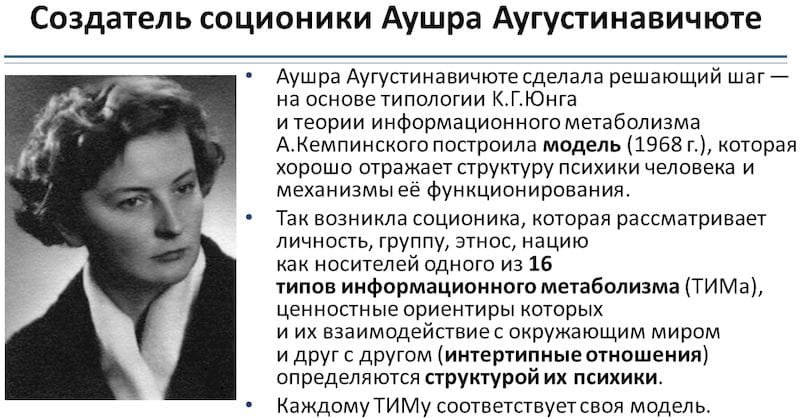Knowing socionics, we can take into account:
- psychological type of the child and his characteristics;
- the unique individuality of his developing personality;
- the child's true needs, abilities and talents;
- a natural change in his hobbies and interests with age.
Socionics describes personality types, their characteristics and relationships between people. Socionics helps to understand:
- How should adults interact with a child?
- How to avoid conflicts when the types of parents and children differ?
- How to raise a child to be a successful person?
- What is the child's future calling?
Knowledge of socionics is necessary for every person!
Where did it all begin? Probably, with Carl Gustav Jung. He was one of the most outstanding psychologists of the 20th century. In his youth, he collaborated with the founder of psychoanalysis, Sigmund Freud, and then their paths diverged. In 1922, Jung published the work "Psychological Types", where he summed up his many years of research. He established what many considered self-evident: all people are different. But he was able to show why exactly these people are different and what causes this. At first, Jung spoke of eight, and then of sixteen psychological types of a person. Of course, each personality is unique. And typology does not deny individuality at all. But what did Jung discover? That a person's type is determined by a combination of his mental functions – thinking, sensation, intuition, feeling, and some others. He also noticed, and this has become firmly established in world psychology, that the attention of some people is more oriented toward the external world, while the attention of others is more oriented toward the internal world. He called the former extroverts (outward-facing), and the latter introverts (inward-facing). The emergence of typology was met with coolness by Jung's colleagues. Well, yes, there may be types of people, they reasoned. So what? And how can we define them? And really, what can a definition of typology give us in practice? If we use only Jung's works, then, frankly, not very much. He and his numerous followers did not quite know how the human psyche works and how to help it. Only half a century later – in the 70s – did a new breakthrough in this field of knowledge occur. A researcher from Lithuania, Dean of the Faculty of Marriage and Family at Vilnius Pedagogical University Aušra Augustinavičiūtė (Ausra in Lithuanian means "dawn", the same as in Latin – "Aurora"), had long been bothered by the question: why do people want to live in harmony, but quarrel all the time? Why do they not always understand each other? So, – Aushra came to the conclusion, – they are arranged in such a way that they exchange information with each other according to certain laws. Aushra's talent and genius were revealed in the discovery of these laws. She organized and supplemented Jung's ideas about the structure of the psyche, and also described the relationships between different types of people.
The emergence of typology was met with coolness by Jung's colleagues. Well, yes, there may be types of people, they reasoned. So what? And how can we define them? And really, what can a definition of typology give us in practice? If we use only Jung's works, then, frankly, not very much. He and his numerous followers did not quite know how the human psyche works and how to help it. Only half a century later – in the 70s – did a new breakthrough in this field of knowledge occur. A researcher from Lithuania, Dean of the Faculty of Marriage and Family at Vilnius Pedagogical University Aušra Augustinavičiūtė (Ausra in Lithuanian means "dawn", the same as in Latin – "Aurora"), had long been bothered by the question: why do people want to live in harmony, but quarrel all the time? Why do they not always understand each other? So, – Aushra came to the conclusion, – they are arranged in such a way that they exchange information with each other according to certain laws. Aushra's talent and genius were revealed in the discovery of these laws. She organized and supplemented Jung's ideas about the structure of the psyche, and also described the relationships between different types of people. Can you imagine what this means?! Hundreds of thousands of books are filled with observations of people's behavior and relationships. And now, having the key, we can predict all this in advance. Within certain limits, of course. This is how a new science emerged – socionics. It deals with many issues. For example, it helps a person understand his life path. How to find a job to his liking? Socionics can determine a person's professional suitability based on personality type. After all, what is its special appeal? It is understandable, it can be quickly studied and applied in everything that concerns human activity. That is why, for its development and practical application, back in 1991,International Institute of Socionics(MIS). By the way, for many years Aušra Augustinavičiūtė was the chief research fellow at MIS.
Can you imagine what this means?! Hundreds of thousands of books are filled with observations of people's behavior and relationships. And now, having the key, we can predict all this in advance. Within certain limits, of course. This is how a new science emerged – socionics. It deals with many issues. For example, it helps a person understand his life path. How to find a job to his liking? Socionics can determine a person's professional suitability based on personality type. After all, what is its special appeal? It is understandable, it can be quickly studied and applied in everything that concerns human activity. That is why, for its development and practical application, back in 1991,International Institute of Socionics(MIS). By the way, for many years Aušra Augustinavičiūtė was the chief research fellow at MIS.

